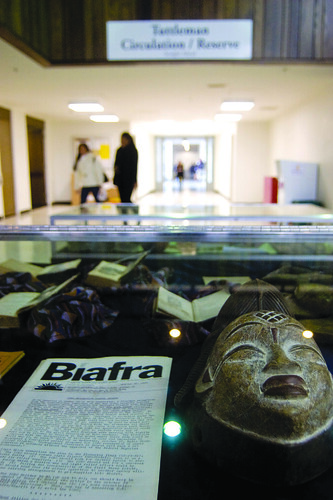Various student organizations pulled together this February to celebrate Black History Month.

Through a collaborative effort between university-sponsored functions and student organization events, there has been much to learn, experience and share on Main Campus for this year’s Black Heritage Month.
Temple was ranked No. 1 in Princeton Review’s 2008 edition of the Best 366 Colleges for most diverse student bodies. African-American and black students make up 16.1 percent of the student population, and there are numerous of black student organizations and Greek chapters.
Black Heritage Month is a tradition with origins that date back to 1920, when the Omega Psi Phi fraternity established “Negro History and Literature Week.” In 1976, the Association for the Study of African American Life and History officially extended the observance to a month-long duration. Since then, the month has been recognized and celebrated nationally at all levels.
Beginning Feb. 9, parts of Main Campus have been transformed into museum exhibits for Celebrating African American history: “What is Africa to Me,” an exhibition celebrating African history and culture with artifacts, books and artwork representing several countries in Africa.
Among the exhibit’s features are a display on religion in Ethiopia, a book by John Buchholzer titled The Land of Burnt Faces: A Journey to Ethiopia and a gold-colored cross consistent with those carried by priests during spiritual ceremonies.
There is also a showcase on Egyptian culture and history that features The Egyptian Book of the Dead, an ancient Egyptian text that contains hymns and prayers that were believed to provide spiritual guidance in the afterlife.
The exhibit covers many media platforms, encompassing not only books and magazines, but also albums and films that focus on African themes. Among them are albums by musical artists Fela Kuti and Sam Mangwana, and the films Dreams of Dust by writer Laurent Salgues and Yeelen, written by Souleymane Cissé.
The exhibit’s displays can be viewed in both the Paley Library, and in the Charles L. Blockson Afro-American Collection in Sullivan Hall. It runs until Feb. 28.
The Black Heritage Committee, a coalition of students and faculty at Temple aimed at facilitating interesting, educational and engaging events throughout the month, created a full menu of events. A slew of organizations with diverse missions and ethnic make-ups – including Student Peace Alliance, LIFT, Temple College Democrats, the Feminist Majority Leadership Alliance and Temple’s chapter of National Council of Negro Women – partnered with the Black Heritage Committee to create a full calendar of programs.
Black Heritage Committee Chair Jessica Reed, who is also the President of Temple’s NAACP chapter, said she is overjoyed with the way the month has progressed.
“Our biggest goal was to reach out to very diverse organizations to collaborate in efforts to celebrate the achievements of black people and generate awareness surrounding issues in the community, and I think we definitely achieved that goal,” Reed said.
Among the events that coincided with the celebrations was the official kick-off program Feb. 2: A panel of speakers that discussed the theme, “The Talented Tenth, Leadership vs. Elitism.”
Event panelists included Dr. Kimmika Williams-Witherspoon, associate professor of theater, and the playwright behind the production SHOT!, which debuted last semester. Other featured academics included associate English professor at Bucknell University and hip-hop scholar Dr. James Peterson; Veronica Michaels, owner of The Legendary Blue Horizon Entertainment Venue in Philadelphia; and Dr. Betteye Collier-Thomas, associate professor of history and director of the Center for African-American History and Culture.
Dominique Wilkins, president of the Black Law Student Association said he was happy for his organization to sponsor a program on the Black Heritage Committee’s lineup of events.
“It’s important for organizations to put on programs in honor of what black people have contributed to American culture,” Wilkins said.
On Feb. 4 in the Student Center Underground, BLSA hosted PhilaLive, a live performing arts event that encompasses several artistic disciplines, including painting, poetry, singing, rapping, acting, dance and live instrumentation. The night’s events also included an open mic segment and featured Temple’s own poetry collective, Babel.
The night was not only for entertainment purposes however. Attendees also had the opportunity to learn about community service organizations from the nonprofit organizations in attendance, including the Blues Babe Foundation, Teach4America, Fight for Lifers, Neighborhood BikeWorks and the Village of Arts and Humanities.
“The event went great. We had over 200 people in attendance,” Wilkins said.
On Feb. 23, Temple’s NAACP chapter will host “Why is the Media Raising Our Children? A discussion on minority portrayal in various types of media and its effect on child rearing.”
Also on Feb. 23, Temple’s Office of Community Affairs is hosting an event called Black Achievement in Theater and Film. It will take place in room 214 of the Community Education Center at 6 p.m. and will feature Emmy- and NAACP Image Award-winning actor and stage director Glynn Turman.
The Second Annual Oscar Micheaux Film Festival will run until March 3 and offers screenings and discussions of many black films in the Student Center.
The mission of such cultural events as Black Heritage Month is to not just replay history to those who know it, but to transcend generational and ethnic boundaries and disseminate ideas and knowledge to all people.
The wide array of events that Temple has hosted, and still plans to have, help fulfill that mission and assure that anyone interested in learning about black history has the opportunity to do so.
“The turnout from organizations and individuals who aren’t necessarily affiliated with African American causes has been phenomenal, and that’s exactly what we need,” Reed said. “I think people realize that there is no ‘American history’ without ‘African-American history.’”
Angelo Williams can be reached at angelo.williams@temple.edu.



Be the first to comment